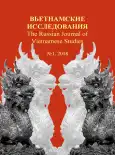Direct speech translation problems in Vietnamese literary texts
- Authors: Britov I.V.1
-
Affiliations:
- Moscow International Academy
- Issue: Vol 2, No 1 (2018)
- Pages: 123-148
- Section: Articles
- URL: https://journal-vniispk.ru/2618-9453/article/view/84225
- ID: 84225
Cite item
Abstract
The article analyzes various methods of translating direct speech into Russian using concrete examples from modern Vietnamese literature. The author made an attempt to comprehend problems in translating Vietnamese literary texts full of characters’ utterances and offers practical solutions to a broad range of difficulties arising in this connection. In particular, he spells out grammatical, stylistic, and culturological specifics of direct speech, which often need to be transformed in translation by means of transposition, substitution, addition, and omission. Much attention is given to the stylistic makeup of direct speech. The article also addresses issues of translation into Russian of Vietnamese greetings, foreign language inclusions, short forms of verbal communication, and colloquial cliches reflecting particular life situations. Topicality of the research object arises from the need to generalize the experience accumulated in translating Vietnamese literary texts into Russian and develop new theoretical provisions in the field of Vietnamese-to-Russian translation. This is an important goal, considering the emerging positive trends in Russian-Vietnamese cultural cooperation. Also, the problem of translating direct speech is connected to that of translating colloquial speech, which is of practical interest to a broad range of experts in Vietnamese studies. Research procedure. The research object is dialogues and utterances of fictional characters in works by modern Vietnamese authors. Various parts of direct speech, including leads, greetings and speech cliches, are highlighted and analyzed. The research indicates the influence of pronouns, sentence-final particles, and inversion on the stylistics of direct speech in Vietnamese texts. Tools of the Russian language which can be used to convey peculiarities of foregrounding in the Vietnamese language are explored. Methodology. The research is based on comparative, structural, and contrasting methods, in addition to stylistic analysis and logical and semantic modeling. Research materials. The work is based on the outcomes of research of Vietnamese literary texts and their translations done by the article’s author. The translations were published in 2015 in the collection of short stories by Vietnamese writers, entitled “V Gorakh Rastet Polyn” (“Wormwood Grows in the Mountains”) (the Lokid Premium publishing house). Theoretical groundwork for the research was laid by modern works in the science of linguistics looking into translation problems from the angle of the general theory of language, semantics, stylistics, and normativity. An emphasis was put on theoretical works developing the ideas of interconnection between the language and culture, area linguistic studies, and psycholinguistics. The research made by Vietnamese linguists enabled the article’s author to view translating problems in the context of the yin-yang language concept. Research results. The research summarized approaches to translating direct speech in literary texts, identified major problems in translating dialogues from Vietnamese into Russian, demonstrated that the primary reason for those difficulties was different linguistic typologies of the languages, and explained the use of various translation transformation methods by the need to ensure muncomicive equivalence between the original text and the translation. Conclusion. Key results are summarized and prospects for further research are outlined. One should expect the emergence of new objects for studies of direct speech in literary texts, which derives from colloquial speech, as colloquial speech in modern Vietnam is experiencing a strong impact from socio-political factors of the country’s life. These factors make further study of the issue necessary.
Full Text
##article.viewOnOriginalSite##About the authors
Igor V. Britov
Moscow International Academy
Email: igorviet@mail.ru
Vietnamese language teacher, Moscow International Academy
References
- Влахов С.И., Флорин С.П. Непереводимое в переводе. М.: Р.Валент, 2012. 406 с.
- Модестов В.С. Художественный перевод: история, теория, практика. М.: Издательство Литературного института им. А.М. Горького, 2006. 463 с.
- Новый большой вьетнамско-русский словарь, т.1. М.: Восточная литература, 2012. 1275 с.
- Новый большой вьетнамско-русский словарь, т.2. М.: Восточная литература, 2012. 1269 с.
- Сюннерберг М.А. Комментарии // Нят Линь. Холод. М.: Ключ-С, 2016. С. 155-264.
- Тургенев И.С. Гамлет Щигровского уезда. URL: http://booksonline.com.ua/view.php?book=38246 (дата обращения: 06.11.2017).
- Эко У. Сказать то же самое. Опыты о переводе. М.: АСТ, 2015. 736 с.
- Khuất Quang Thụy. Ngày nghỉ cuối tuần [Кхуат Куанг Тхюи. Выходной в конце недели]. URL: http://www.ybook.vn/tac-gia/2973/Khu%E1%BA%A5t+Quang+Th%E1%BB%A5y (дата обращения: 15.11.2017).
- Lê Văn Thảo. Ông cá hô // Truyện ngắn chọn lọc. [Ле Ван Тхао. Господин Гигант-усач //Избранные рассказы]. Hà Nội: Hội nhà văn Việt Nam, 2003. Tr. 165-180.
- Mai Ngọc Chừ, Trịnh Cẩm Lan. Tiếng Việt cơ sở [Май Нгок Тьы, Чинь Кам Лан. Основы вьетнамского языка]. Hà Nội: Phương Đông, 2014. 192 tr.
- Ngô Thị Kim Cúc. Vô ngôn [Нго Тхи Ким Кук. Держать язык за зубами]. URL: https://banvannghe.com/a5259/vo-ngon-ngo-thi-kim-cuc (дата обращения: 25.10.2017).
- Nguyễn Quang Thiều. Mùa hoa cải ven sông [Нгуен Куанг Тхиеу. Ковер цветущего рапса на речных берегах]. URL: http://vov.vn/van-hoa/van-hoc/mua-hoa-cai-ven-song-114660.vov (дата обращения: 09.11.2017).
- Tạ Duy Anh. Cổ tích mới /Truyện ngắn chọn lọc [Та Зуи Ань. Сказка на новый лад / Избранные рассказы]. Hà Nội: Văn hóa Dân tộc, 2009. Tr. 198-219.
- Thiên Can. Duyên. [Тхиен Кан. Очарование]. Maxcơva: Sáng tạo, 2000. 106 tr.
- Tô Hoài. Tình buồn [То Хоай. Печальная история]. URL: http://vietmessenger.com/books/?title=tinhbuon (дата обращения: 16.11.2017).
- Vũ Bão. Người muôn năm cũ [Ву Бао. Старец]. URL: http://vannghequandoi.com.vn/Van-xuoi/nha-van-bao-vu-va-truyen-Аngan-nguoi-muon-nam-cu-10574.html (дата обращения: 30.10.2017).
Supplementary files







